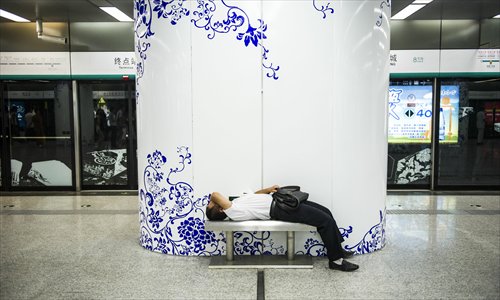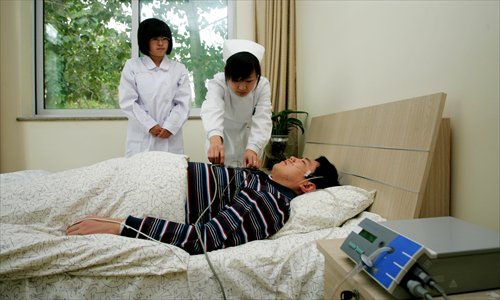Wake-up call for World Sleep Day

A man naps at a subway station on Line 8. Beijing residents rank among China's worst when it comes to getting adequate sleep, according to the 2013 China Sleep Quality Index. Photo: Li Hao/GT
Do you yawn throughout day? Do you rely on coffee to stay alert? Does your desk have a permanent imprint of your head from office naps? If so, there has never been a better time to reclaim your lost slumber and improve your health.
Since 2008, World Sleep Day has been marked every year in March and endorsed by the World Association of Sleep Medicine. The day, which this year fell on March 14 and was themed "Restful Sleep, Easy Breathing, Healthy Body," aimed to raise awareness about the benefits of good sleep and prevention of obstructive sleep apnea (OSA).
World Sleep Day festivities in China, organized by the Chinese Sleep Research Society (CSRS), will be held on March 21 under the theme of "Healthy Sleep, Safe Trip" to highlight the link between good sleep and safe driving.
Chen Guoyi, 30, participated in a group talk about improving sleep held for World Sleep Day last year amid her battle with insomnia. She plans to join a similar discussion this week to seek further help for her condition.
"Insomnia is becoming a big problem. How I miss the days when I was younger and could fall asleep in five minutes," said Chen.
At last year's group talk, Chen learned about OSA for the first time and realized she wasn't alone with her sleeping disorder. Her snoring husband suffers abnormal stoppages in breathing while sleeping, one of the most common indicators of OSA. "Sometimes there are pauses during his snoring and it sounds like he's not breathing at all," said Chen.

Sleep centers and labs have opened at around 3,000 hospitals across China to help diagnose common sleep disorders. Photo: CFP
Deadly sleep disorders
Symptoms of OSA include heterogeneous snoring, dry mouth, fatigue during the day and neuro-cognitive deficits.
Left untreated, OSA can increase the risk of stroke, abnormal heart rhythm, high blood pressure, cardiovascular disease and diabetes. Most people living with the condition are unaware, undiagnosed or not receiving treatment.
"New epidemiologic data reveals that clinically significant sleep apnea occurs in 13 percent of men and 7 percent of women. These numbers indicate epidemic proportions that require concerted action," Antonio Culebras, co-chair of World Sleep Day and professor of neurology at the State University of New York's Upstate Medical University, told Metropolitan in an e-mail interview.
Sufficient length, continuity and depth of sleep are essential for a good night's rest, Culebras added. There is good news for OSA sufferers, however, with experts saying some of its major causes can be mitigated through simple lifestyle changes.
Smoking and obesity are key triggers of OSA, with the latter blamed for restricting breathing during sleep. "In adults, smoking and obesity increase exponentially the chances of developing sleep apnea. In children, inflamed, enlarged tonsils are a major culprit behind the disease," Culebras said.
Research has found there is a continuum of disorders among adults that goes from obesity to sleep apnea to heart attacks and stroke. "Somewhere in the midst of this chain of events we find hypertension that is worsened by sleep apnea, diabetes that is affected by sleep apnea and atrial fibrillation, a dangerous irregular rhythm of the heart that is more common in sleep apnea patients," Culebras said.
Besides leaving sufferers feeling tired and unhappy, sleep disorders can also be life-threatening. Han Fang, a respiratory specialist at Peking University People's Hospital and board chairman of the CSRS, said he has dealt with patients who have died from complications with OSA.
"Sudden death is actually quite common [from OSA]. Some people get very drunk, lie down and never wake up," said Han.

Getting a good night's sleep seems simple, but for many people it can be a nightmarish task. Photo: IC
Sleep medicine in China
Han noted that despite the high rate of people living with OSA in China, national awareness of the disorder is disturbingly low. "One in every four people who snores has OSA. Around 4 percent of the Chinese population has it," he said.
Concerned at her husband's snoring, Chen has unsuccessfully tried to persuade him to seek medical treatment. "One of his reasons for not going to see a doctor was that we didn't know which hospital department we should make an appointment with," she said.
Culebras advises patients with sleeping disorders to first see their family physician who can then refer them to a specialist capable of determining whether a sleeping test in a laboratory is necessary to monitor slumber behavior.
In the absence of sleep specialists, Culebras suggests people troubled by insomnia see a psychologist or psychiatrist; people with excessive daytime fatigue and sleepwalking or abnormal activity during sleep, including nightmares, see a neurologist; people who snore or have difficulty breathing at night see a pulmonologist (lung specialist) or otolaryngologist (ear, nose and throat specialist); and children see a pediatric doctor.
Sleep medicine is a recognized medical discipline in many countries, but not China. "The US made it an independent field in 2007. We have actually been studying it in China since the 1980s, but previous lack of support caused our research to lag. Sleep disorders are often treated in pneumology, pediatric or otolaryngology departments," explained Han.
About 3,000 hospitals in China have set up sleep treatment centers and labs to meet growing demand from patients, said Han. "More than 80 hospitals in Beijing, including small hospitals in the city's rural outskirts, have opened sleep treatment departments. Their techniques of assessment and treatment have matured to be quite prudent today," he said.
Sleepless in Beijing
Han has been increasingly busy in recent years due to a spike in patients seeking treatment for sleep disorders.
Although there are around 90 sleep disorders, most feature one of three distinct symptoms: trouble falling asleep, trouble waking up and habitual daytime sleeping.
"The common symptom is that daytime life is greatly influenced by sleepiness, loss of short-term memory and impaired concentration," said Han. "It is extremely dangerous for people suffering sleep disorders to drive or operate machinery. Those who do are seven times more likely to be involved in traffic accidents than regular motorists."
Even though there are smartphone apps to play sounds that aid slumber and mattresses embedded with magnets to improve sleep quality, the high-pressure metropolis lifestyles many of us lead can make sleeping seem like a nightmare.
"City life, stress, time constraints, deadlines, dense traffic, urges to satisfy upward mobility in the job, short duration of sleep caused by social demands and nocturnal noise are all factors that may decrease the ability to initiate and maintain a restful sleep," said Culebras.
The 2013 China Sleep Quality Index released by the Chinese Medical Doctor Association divided cities in China into four categories: good-dream, peaceful-sleep, light-sleep and sleepless cities. Beijing along with Guangzhou and Dongguan in Guangdong Province were listed as sleepless cities due to their poor sleeping environment and residents' poor slumber activity.
The overall index for 2014 was 66.5 points out of 100, slightly up on 64.3 in 2013. About 36 percent of people failed to score 60 or higher, compared to 25 percent the previous year. The figures indicate that people's sleep has been improved overall, even though more Chinese are seeking treatment for sleep disorders.
In terms of professions, the study found teachers sleep the best followed by civil servants. People working in the media were found to sleep the worst, with small business owners and those in public relations and advertising not faring much better.
The yang and the restless
Chen Mei, 29, recently bought a pillow online filled with traditional Chinese medicine (TCM) herbs said to be able to "soothe the nerves."
"I'm especially sleepy during spring," said Chen, an office clerk, adding that many of her friends had tried everything from lavender-stuffed bears to melatonin pills to get some good shut-eye.
Melatonin is a hormone that helps control sleeping and waking cycles that can be bought from nutrition stores without prescription. It is a popular choice for people wanting longer, deeper sleep, but Han warned it can spike blood pressure.
"You must only take melatonin under a doctor's guidance, otherwise it can mess with [natural] levels of melatonin," he said.
Despite the wide range of products and supplements available that supposedly aid sleep, Han said it is best for people to remember there is no "quick fix" to sleep disorders.
According to TCM theory, "spring sleepiness" is a common phenomenon because the season causes yang (an active, masculine force in Chinese philosophy) to "grow both inside one's body and in the nature," said Wang Yuntao, a doctor at the Beijing Dongwen TCM Clinic.
"The rising yang inside the body disturbs one's mind, resulting in light sleep at night and daytime fatigue," said Wang.
Insomnia is caused by depression of the qi (life energy), according to TCM theory.
"People who have light sleep, multiple dreams and trouble falling asleep after waking in the early hours are often under great pressure and irritable," noted Wang, who advises people to "sleep late and wake early" during spring and summer as long as they still get an adequate amount of sleep.
"By sleeping late and waking early, circulation of the yang is prolonged, allowing people to work more and rest less. This means going to bed at around 10 pm and getting up at 5 or 6 am. Eight hours of sleep per night is more than enough throughout spring," said Wang.
10 tips to improve your sleep at night
Getting a good night's sleep doesn't have to be an impossible dream. These tips, offered by the World Association of Sleep Medicine and doctors interviewed in this story, are intended for "typical" adults, but not necessarily children or adults with existing medical conditions.
1. Develop a regular sleep timetable with a consistent bedtime and wake-up time.
2. Don't nap longer than 45 minutes during the day.
3. Avoid smoking, drinking alcohol or coffee, and eating too much for dinner.
4. Avoid playing with your smartphone or tablet computer in bed.
5. Sleep on a comfortable mattress.
6. Ensure your bedroom is dark, quiet and at a comfortable temperature.
7. Drink chrysanthemum tea, green tea and green bean soup.
8. Avoid spicy, sugary and fatty foods as well as cold drinks.
9. Massage taichong acupoints located on the dorsum of the foot (underneath the big toes) before bedtime.
10. Turn your bedside clock away if you can't fall asleep.